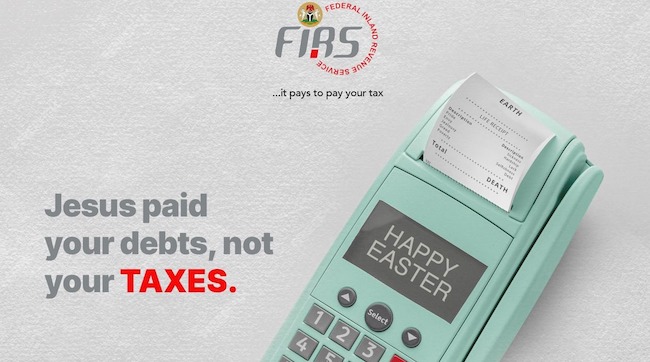
The FIRS, in an X (formerly Twitter) post, #FIRSNigeria, had shared a picture of a Point of Sale machine with the caption, “Jesus paid your debts, not your taxes.”
The post had elicited reactions from Nigerians, particularly Christians, who condemned the post.
Although the post has been taken down, CAN’s National Director of National Issues and Social Welfare, Abimbola Ayuba, in a statement on Tuesday, called on President Bola Tinubu, the Minister of Finance, Wale Edun, and the Department of State Services to take cognisance of the incident and guide the FIRS in adhering to only messages that promote unity and peace.
The statement read in part, “In the light of recent events, we call upon the management of the FIRS to retract the message and offer a public apology for the distress caused.
“We also urge the President of the Federal Republic of Nigeria, Senator Bola Ahmed Tinubu, Minister of Finance, Wale Edun, and the Department of State Services to take cognisance of this incident and to guide the FIRS in adhering to communication strategies that promote respect, unity, and cohesion.
“As a nation that prides itself on religious harmony and peaceful coexistence, we are deeply concerned by the recurrence of provocative messages around religious holidays. This year, a public institution, which should be the bastion of exemplary conduct, has been implicated in disseminating content that is widely regarded as offensive and derogatory to the Christian faith.
“The Easter period, a time of solemn reflection and sacred observance for Christians, should not be juxtaposed with civic obligations in a manner that trivialises or mocks core religious beliefs. Religious convictions are at the heart of our identity and deserve the utmost respect.
“The analogy drawn by the FIRS between the pivotal Christian doctrine of redemption, and the civic duty of tax payment has been received with distress and indignation by the Christian community.”
The association advised all public and private organisations to exercise caution and consideration for the diverse religious backgrounds of the society.
It said communications, especially from public institutions, should be crafted with a clear understanding of the cultural and religious tapestry that defines the nation.





